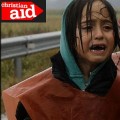The pandemic has made us so much more neighbourly …
… or has it? Perhaps it depends who we think of as neighbours! A famous question rings down the ages – ‘Who is my neighbour?’

We live on a pretty small planet. Far-off countries come nightly into our living rooms – no longer do we know nothing about them. We know that in Yemen, a civil war has decimated health systems, provoked widespread hunger, and killed almost 250,000 people. It’s a conflict that requires immediate aid. In Syria over 11 million people are in dire need of humanitarian assistance. Both war-torn countries are on the brink of severe famine. So is the Sahel region of Africa, and Southern Sudan. Two of the world’s most fragile regions. No wonder the Disasters Emergency Committee (DEC) is appealing urgently.
But as a country we – the UK – have just halved our aid to the Yemen and South Sudan. UK aid to Syria will be cut by 67%. Humanitarian support for the Sahel is to be cut by 93%. It looks as if we might slash even more support for the world’s most unstable crises in the coming weeks and months. However we view it, the impact of the government’s cuts (hopefully temporary?) to the UK Aid budget is becoming obvious. These cuts will cost the lives of hundreds of thousands of civilians.

Yes – we have a proud record of international aid. Quite apart from moral, humanitarian considerations, it’s actually ‘soft diplomacy’, and a major investment in world peace. Total aid spending is already less than 1% of the UK’s gross national income. In the lead up to the last election, all parties committed themselves to 0.7%. The pandemic has of course made things desperately worse for us economically. But if it’s bad for us – how bad can it be for such countries as Syria, Yemen, South Sudan? Last autumn, the Chancellor backtracked on the promise, and we are now seeing the consequences. While these cuts will make little difference to the UK public, they will devastate the poorest people in the world.
We care. Perhaps you do too?
We care. Perhaps you do too? We know many people who do… Of course, if we can afford it, we can increase our personal support for the charities that work in the poorest countries.

Chritian Aid
We probably all have our own favourites. Ours is Christian Aid because of its Christian principles, its links to churches here and abroad, its commitment to helping poor and disadvantaged people of whatever faith or none, and its working with communities on the ground.
Disasters Emergency Committee (DEC)
There’s also the Disasters Emergency Committee (DEC) which is a consortium of 14 Aid Charities (including Christian Aid) that come together for awareness – and fund-raising for really big disasters – as now. Money goes to the charities that are most able to help in a particular region. But we have to recognise that the Government cuts are going to bite deep.

Whoever we voted for, we have a right to question a government that appears to depart from its promises. There are various options. One is to stay informed:
- Bond – UK network for organisations working in international development.
- One.Org: ONE is a global movement campaigning to end extreme poverty and preventable disease by 2030.
- Global Citizen: To build a movement of 100M action-taking Global Citizens to help achieve our vision of ending extreme poverty by 2030.
- And/or lobby our MPs or others in Parliament.
- Winchester and Chandler’s Ford (Cons): Steve Brine : steve.brine.mp@parliament.uk
- Eastleigh (Cons): Paul Holmes: paul.holmes.mp@parliament.uk
- Romsey and Southampton North (Cons): Caroline Nokes : caroline.nokes.mp@parliament.uk
- Southampton, Test (Labour): Dr Alan Whitehead: whiteheada@parliament.uk
After all, who is my neighbour? Ah! – that was the question Jesus answered wasn’t it?

Written by Peter & Maggie Lippiett






Thank you Peter and Maggie for your thought-provoking, heartstring- tugging article.
I have spent much time over the past few years raising money for a safe house for abused children in a township in South Africa by giving anecdotal talks and reading poetry to amuse and entertain. I have visited the safe house and receive regular communications and I know that the money I raise is appropriately spent to DIRECTLY benefit and safeguard the children.
I, like many generous people, am concerned about reports that sexual exploitation and abuse are still happening in the aid sector. A recent comment by Sarah Champion MP, International Development Committee Chair, states ‘Aid beneficiaries, by their very nature, are the most vulnerable people on the planet. I have huge admiration for the aid sector, but it needs to wake up to what is going on and embed safeguarding within all of its programmes. Our enquiry has found that abuse of beneficiaries is rife and the sector has effectively become the last safe haven for perpetrators. Until they (the perpetrators of exploitation and abuse) are driven out of the sector, there remains a dark shadow across their good work.’
I am very troubled by this statement and, like many, suspicious of the realities of what is happening. This is not to decry the thousands of decent people who are genuine workers on the ground or the desperate need that exists in war-torn countries and areas ravaged by disease and natural disaster.
I also have to say that I am suspicious of charitable organisations that pay their Chief Executives enormous salaries while being funded by ordinary people with a conscience who, in some instances, scrimp and save to ‘do the right thing’.
There is clearly no easy answer and we are, indeed, global citizens and carry humanitarian responsibility – as do our politicians – but the reality is stark and disturbing and must be addressed.